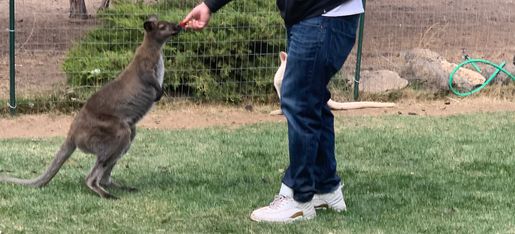Prickly**Affectionate**Spindled**
African Crested Porcupine
The African Crested Porcupine is the third largest rodent in the world (next to the Beaver and Capybara). Africans are common in sub-Saharan Africa but can be found as far away as northern Africa, Asia, and Italy. These gentle animals can weigh up to 60 pounds and often grow to three feet in length excluding the tail. When Africans are threatened, they will flare their quills, stomp, their feet, and shake their tail quills. The quills on their rump are hollow, about 7 inches long and thicker than the quills on their body. When shaken the quills are capable of sending out an alarming hiss-like rattle which is used to scare off predators. They also have "first contact" quills that are much longer than their main defense quills that when touched will warn the porcupine that the predator is too close. These quills are not capable of injury and are used as a warning system. To help create an illusion of great size they will also raise up their crest along their head and neck adding an extra 18 inches to their already 21 inch height (thus their "crested" name). So dangerous are their quills that they have been known to kill lions, hyenas, and leopards! Baby porcupines are called "porcupettes" and are born with hair and open eyes. Their quills remain soft until two weeks of age. In the wild Africans are nocturnal and monogamous and live in small family groups called "Prickles". These Prickles consist of a male, female, and their young. As a terrestrial animal (ground), the family unit will live in a complex system of burrows. Diet consists of mostly plants, roots, some insects and small vertebrae. Two types of Porcupine exist: Old world (Africa, parts of Asia and Europe; 12 species), and New World (North America and South America; 19 species). New World are loners or solitary animals, arboreal (hang out in trees) and only come together to breed. Old World are highly social, enjoy mutual grooming, and can become depressed if they are left alone. Our Porcupine shares her space with two bunnies and seems happy with the arrangement.

A Spunky Adorable Porcupine!!~
Bottle Feeding a Porcupette
Affectionate and easily handled, Lucinda enjoys her bottle with my friend Terria
Lucinda loves to play
African Crested Porcupines are playful, affectionate, and quite intelligent.
A Pitbull and a Porcupette
Lucinda loves her doggie friends, though they are not so hot on her. Emory just lays there like such a good girl certain she will soon die a slow painful death!!
More videos of Lucinda
Lucinda LOVES her snuggles
One can never love too much on this girl
Corn Stays!!
Lucinda LOVES her corn. There is NO way I could ever remove an ear from her grasp. She only runs away though and never tries to nip. These animals are such calm and genteel creatures. We can forgive her the one stubborn quality she has.
Cool Grandma
Lucinda is so small here. But even so not everyone felt brave enough to hold a porcupine!.

This website uses cookies.
We use cookies to analyze website traffic and optimize your website experience. By accepting our use of cookies, your data will be aggregated with all other user data.